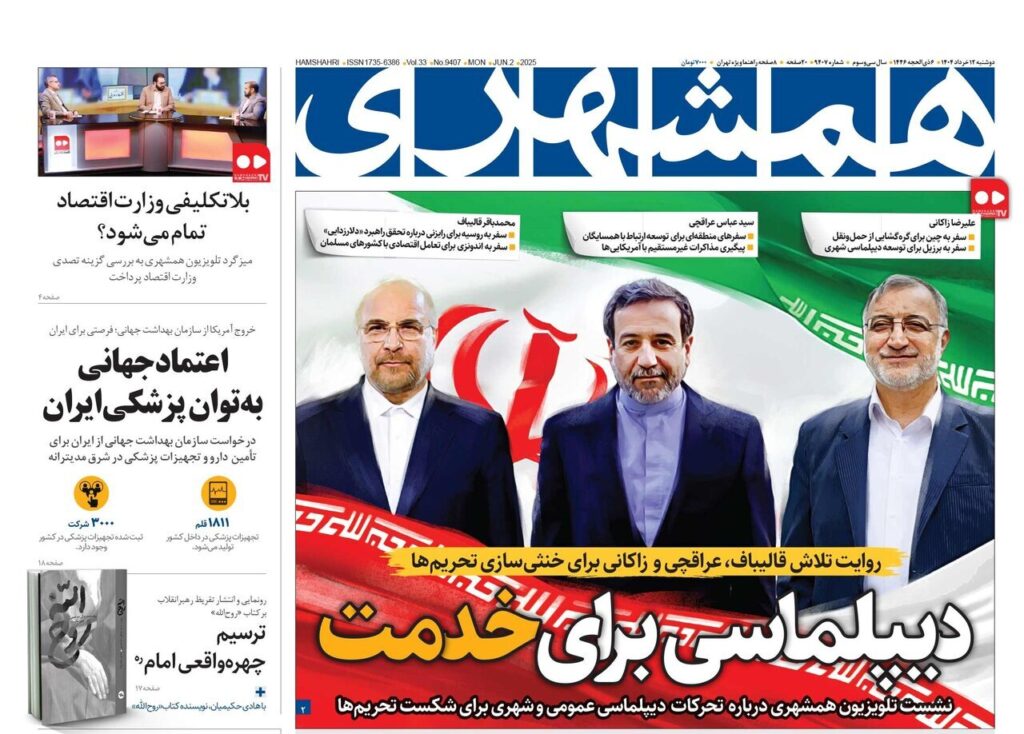Tehran – In the analysis, Hamshali highlighted a unique diplomatic initiative involving three top Iranian officials, describing it as a sign of Iran’s approach to dynamic and multifaceted foreign policy.
The newspaper said diplomatic engagement has become one of Iran’s crucial features at the current stage, with a particular emphasis on prioritizing decentralising nuclear negotiations and solving long-standing challenges. As part of this strategy, Foreign Minister Abbas Aragut will visit Egypt and depart for Lebanon. Meanwhile, on Sunday, Congress President Mohamad Bakar Kalibahu embarked on a regional tour of Latin America. His trip, pursuing multiple objectives, is expected to play a key role in deepening Iran’s economic ties with countries such as Venezuela, Brazil and Cuba. In another important development, Tehran Mayor Alileza Zakhani traveled to Brazil where he was appointed vice president of the BRICS URBAN Forum. Taken together, these diplomatic efforts represent a consistent triangle of engagement: aligning diplomacy, parliamentary diplomacy and urban diplomacy. This has actively supported Iran’s comprehensive strategy of “neutralizing sanctions” in recent months.
Jam-e-Jam: An agreement violated by the agency
In his editorial, Jam-e-Jam examined a recent report by the International Atomic Energy Agency (IAEA) on Iran’s nuclear activity and criticised it as a violation of previous understanding. This article recalls past suggestions in which Iran agreed not to voluntarily expand its 60% uranium enrichment stockpile in exchange for the IAEA Committee’s refrain from issuing important resolutions. This compromise reached during IAEA Director Rafael Grossi’s visit to Tehran was designed to reduce tensions and pave the way for diplomacy. However, according to Jam-e-Jam, this diplomatic path was ultimately blocked, thanks to the claims of three European countries and US support. In response, Iran announced that it would no longer be bound by voluntary restrictions beyond the requirements of the NPT and protection agreement. The editors conclude that Iran’s 60% increase in uranium reserves is a natural and legitimate response to a violation of the informal Western agreement. “If anyone has the basis for a complaint, it’s Iran,” the work argued, adding that it was the IAEA and European states that hampered constructive involvement.
Siasat-e-Rooz: The US crossed the red line of Iran
In his editorial, Siasat-e-Rooz criticized the latest US stance on Iran’s nuclear program, saying Washington effectively crossed one of Tehran’s fundamental red lines. The US has proposed to halt uranium enrichment in exchange for a formal recognition of Iran’s right to do so, according to the newspaper. The editor warns that if Iran agrees to such terms, it will waive legal rights set out under international law. “Peaceful enrichment of uranium is the right of all IAEA members,” the paper stated, adding that acknowledging this would only burn the US and its allies to make further illegal demands. While both sides may ultimately benefit from the new agreement, Sheasat et Loose argues that the US position is intended to hamper consultations. “The US is well aware that uranium enrichment is a red line for Iran, but it continues to raise the issue,” the editor said. He concluded that negotiations are unlikely to succeed unless Washington retreats and recognizes Iran’s right to peaceful enrichment.
Arman-e-Melli: Delivering a US message to Tehran
After five rounds of indirect talks in Muscat and Rome, Iran and the United States appear to be heading towards the sixth round of negotiations. According to some analysts, it can lead to a breakthrough or at least lay the foundation for a final agreement. Arman-e-Melli points out that both Tehran and Washington appear to be more committed and focused than the previous round, and the continued progress in consultation itself suggests that meaningful progress has been made. Although initial expectations were low, the fact that five rounds were already happening is a sign of mutual willingness to continue the dialogue. Iran’s main demand remains the complete lifting of sanctions, with the US continuing to seek assurances that Iran will not develop nuclear weapons. It remains to be seen whether Washington will ultimately agree to Iran’s terms, but the possibility of another American backtrack remains a concern. This article concludes that future progress will depend on whether the US supports its promise or whether it cannot be provided again.

